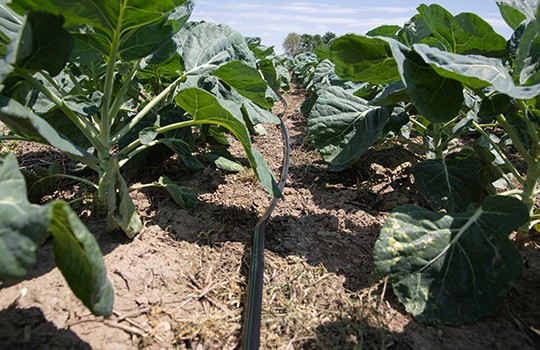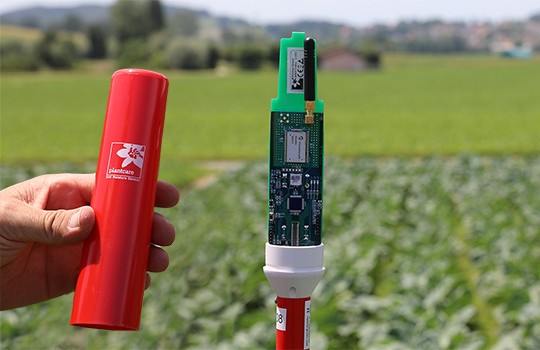IoT
Down on the farm with the Internet of Things: how smart irrigation systems work
If plants get the right amount of water exactly when they need it, they will thrive so well. This is made possible by the internet of things. Swiss company PlantCare leverages IoT enabled soil moisture sensors, which are networked using the Enterprise IoT LPN LoRaWAN (Long Range Wide Area Network). The sensors are in use on the vegetable fields of Reto Minder in Jeuss (FR) and provide the experienced farmer with important information about soil moisture.
Text: Martina Longo, 12 july 2019
Smart agriculture is the future
New technologies, particularly the IoT, are increasingly important in agriculture and vegetable production. They simplify time-consuming jobs, take care of routine activities, save time and money, and enable resources to be used efficiently. In the future, productive, sustainable, conservation-focused agriculture will be the norm, a fact which is borne out by current research projects being undertaken by Agroscope. Through the use of smart technologies, farms can remain competitive and increase their income. This is certainly true of Reto Minder’s farming business, where IoT technology is deployed in the form of a smart, automated irrigation system.
“The leaves don’t get wet, making the plants more resilient to pests. What’s more, the system saves me around 50% on my water and electricity bills”
Reto Minder
Automated irrigation: efficient and sustainable
From some distance away, the narrow, red sensors can be seen rising between the fields of Brussels sprouts. Robust yet flexible and attached to a long pole, a probe is inserted into the ground and collects important data. The sensors register the amount of water the plants need and when it is needed, sending this data to the installed irrigation system. This information simplifies farmer Minder's daily work: “Since installing the PlantCare sensors in the fields, we haven’t had to carry out any time-consuming soil-moisture monitoring or water the vegetable fields. Now, once the moisture in the soil falls below a predefined moisture threshold, the plants are watered automatically.” Water is fed automatically through the specially designed drip-irrigation pipes, irrigating the roots of the Brussels sprouts with pinpoint accuracy. As Minder explains: “The leaves don’t get wet, making the plants more resilient to pests. What’s more, the system saves me around 50% on my water and electricity bills”. Reason enough to implement such an irrigation system.

Thanks to automated irrigation Brussels sprouts grow under ideal conditions.
The sensors also offer other environmentally beneficial advantages: as well as reducing the consumption of water and electricity, the system allows a more targeted use of fertilisers and pesticides, minimising their environmental impact. Furthermore, the smart irrigation system ensures that Minder benefits from a uniform, high-quality crop. “My customers want consistently high quality. I can only sell my sprouts at the agreed price if they meet expectations. And you can only grow consistently high-quality Brussels by giving them precisely the right amount of water.”
Reto Minder explains the added value of automated irrigation.
Enterprise IoT LPN LoRaWAN: sensors communicate across vast distances
The sensors are connected wirelessly to each other and send the collected data over Swisscom’s Enterprise IoT LPN LoRaWAN network. Since the introduction of this new IoT technology in automated irrigation systems, it has been possible to install the sensors in fields quite some distance from each other; something confirmed by Reto Minder: “Despite the significant distance between the sensors, the automated irrigation system works fine. The data is analysed reliably and displayed on my app.”
Enterprise IoT LPN LoRaWAN is the ideal network for IoT applications. With nationwide coverage of 97%, Enterprise IoT LPN LoRaWAN is guaranteed virtually anywhere in Switzerland. It enables small data volumes to be transmitted across large distances using very little energy: “My sensors run off conventional batteries which will easily last an entire season. And once the batteries do finally start to run out, I receive an automatic message, ensuring that I know they’ll need replacing soon,” Minder explains.

The electronics of the soil moisture sensors are weatherproof and have a long service life.
Testing and tinkering his way to success
There is huge potential for other IoT applications in the agricultural sector. Indeed, other new technologies will soon be deployed on Reto Minder’s farm. “My tractors operate with automated steering systems. These collect information on the sections of field covered. At the moment, each tractor can only retrieve the data relating to its own route; however, soon all the vehicles will have constant access to the data from all the other tractors thanks to cloud-based data storage. This will allow us to use our resources in a more effective, targeted way,” explains the innovative farmer.
This passionate vegetable grower is interested in technology, has an affinity for innovative methods, is curious and demonstrates a willingness to take risks: “I always love to try out new things. I sometimes trial organic pesticides or experiment with different field management methods.” He keeps his finger on the pulse, trying out unconventional methods and sometimes having to deal with setbacks. Reto Minder describes his approach as follows: “Sometimes I have bad luck and things don’t turn out as expected. However, most of the time, things work out and all the trials are worth it,” he says with a smile. The latest advances in technology mean it is now possible to reconcile economic efficiency with ecology, conserving resources while at the same time guaranteeing a good yield and income.
More on the topic
